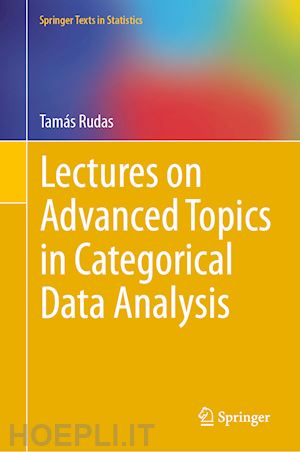
Questo prodotto usufruisce delle SPEDIZIONI GRATIS
selezionando l'opzione Corriere Veloce in fase di ordine.
Pagabile anche con Carta della cultura giovani e del merito, 18App Bonus Cultura e Carta del Docente
This book continues the mission of the previous text by the author, Lectures on Categorical Data Analysis, by expanding on the introductory concepts from that volume and providing a mathematically rigorous presentation of advanced topics and current research in statistical techniques which can be applied in the social, political, behavioral, and life sciences. It presents an intuitive and unified discussion of an array of themes in categorical data analysis, and the emphasis on structure over stochastics renders many of the methods applicable in machine learning environments and for the analysis of big data.
The book focuses on graphical models, their application in causal analysis, the analytical properties of parameterizations of multivariate discrete distributions, marginal models, and coordinate-free relational models. To guide the readers in future research, the volume provides references to original papers and also offers detailed proofs of most of the significant results. Like the previous volume, it features exercises and research questions, making it appropriate for graduate students, as well as for active researchers.
Tamás Rudas is Professor Emeritus in the Department of Statistics of the Faculty of Social Sciences, Eötvös Loránd University, Budapest. He is also an Affiliate Professor in the Department of Statistics, University of Washington, Seattle. He is a Fellow of the European Academy of Sociology and a former President of the European Association of Methodology. He was Founding Dean of the Faculty of Social Sciences of the Eötvös Loránd University and has held visiting positions in several statistics departments in the US and Europe. Dr. Rudas' publications include Lectures on Categorical Data Analysis (Springer 2018). His research deals with methods for the analysis of categorical data, including generalizations of the log-linear model like marginal and relational models, the assessment of model fit, and topics in survey statistics.











Il sito utilizza cookie ed altri strumenti di tracciamento che raccolgono informazioni dal dispositivo dell’utente. Oltre ai cookie tecnici ed analitici aggregati, strettamente necessari per il funzionamento di questo sito web, previo consenso dell’utente possono essere installati cookie di profilazione e marketing e cookie dei social media. Cliccando su “Accetto tutti i cookie” saranno attivate tutte le categorie di cookie. Per accettare solo deterninate categorie di cookie, cliccare invece su “Impostazioni cookie”. Chiudendo il banner o continuando a navigare saranno installati solo cookie tecnici. Per maggiori dettagli, consultare la Cookie Policy.